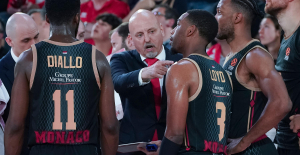2022 was also a tough year for the Hamburg port logistics group HHLA. The war in Ukraine is threatening the lives of HHLA employees in the port city of Odessa, and the global flow of goods has come to a standstill as a result of the pandemic. In the fall, the federal government intervened in the planned participation of the Chinese state-owned shipping company Cosco in the Hamburger Terminal Tollerort. And the deepening of the Elbe has so far not brought the hoped-for results. In the interview, CEO Angela Titzrath, 56, looks at HHLA's plans and prospects.
WELT AM SONNTAG: Ms. Titzrath, the first year of the war in Ukraine is almost over. How are your employees at the HHLA terminal in Odessa and those who came to Hamburg doing?
Angela Titzrath: Our employees in Odessa experience winter cold, power outages, drone attacks and bombings. We have just sent three containers of relief supplies to Odessa, financed from our relief fund set up immediately after the start of the war. For us, this war has faces and names. 37 of our employees are currently on duty at the weapon, about 30 are on duty at the terminal. Together with partners, we operate a land bridge from our terminal in Trieste, Italy, which we use to help supply the Ukraine. Most of the more than 100 people, mainly women and children, who came to Hamburg with our support in 2022 have now found their own accommodation. Five employees from Odessa now work from here. The support staff in our company for the Ukrainian employees continues to do a great job. We will continue our help in the year ahead.
WELT AM SONNTAG: What is the situation at the terminal, which was one of the most important port facilities in Ukraine before the war?
Titzrath: The safety of our employees always comes first for us. We improvise as needed and according to the respective possibilities. We hope and believe that in 2023 ways will be found for peace in Ukraine. The port in Odessa will also play an important role in the reconstruction of the country. It is an important symbol for the city and the whole of Ukraine that the port is still functional.
WELT AM SONNTAG: Hamburg and its neighboring countries are currently improvising on the Elbschlick. In your opinion, what should a resilient and long-term solution for sediment management look like?
Titzrath: As HHLA, we are a customer of the Elbe waterway. Keeping them free of sediment is the necessary prerequisite for us to remain competitive at all. There are target depths that must be observed, as must maintenance of the fairway. The basic attitude here must be the same as, for example, with the federal motorways. What is the abrasion of tar or the wear and tear of the roadway in the case of roads corresponds to the entry of sediment or damage to the embankments of the fairway in the case of a waterway. The responsible authorities of the federal states and the federal government have to live up to their responsibility and fulfill their tasks reliably. This applies not only to the Elbe, but also to the Jade, the Ems, the Weser and other rivers. Of course, this also includes the question of where the silt will ultimately be dumped. Reliable, pragmatic solutions must be found for this. For example, the sand that makes up most of the sediment could be used as a barrier.
WELT AM SONNTAG: Are the federal and state governments doing enough to clear and maintain the waterways?
Titzrath: The sometimes very emotional and ideologically charged discussion about Cosco's minority stake in the Tollerort terminal showed how immensely important the Port of Hamburg is as a critical infrastructure for Germany as a business location. If you look at it that way, then it includes maintenance of the lower Elbe fairway and compliance with the target depths for seagoing vessels. The national port strategy, which will hopefully be available in 2023, can provide clarity.
WELT AM SONNTAG: According to the will of the federal government, the Chinese state-owned shipping company Cosco can take a 24.9 percent stake in the operation of the Tollerort terminal instead of 35 percent, as initially planned. When can you complete this venture with Cosco?
Titzrath: We are currently still waiting for the final agreement with the federal government.
WELT AM SONNTAG: Is HHLA planning further partnerships with Cosco, such as joint investments in terminals in Europe?
Titrath: No. With regard to Cosco, we are talking about a strategic partnership, which is how we describe the closest possible cooperation. We also do this in our customer relationships, for example with the shipping companies Hapag-Lloyd or Evergreen. Some time ago there were considerations as to whether our subsidiary HPC, which develops port facilities worldwide, would accept a consulting contract for a port project in China. But this project was not realized.
WELT AM SONNTAG: The media reported recently about HHLA's goal of saving 1.25 million working hours a year and thus many jobs at the Hamburg terminals. Are these new plans of your company?
Titzrath: In December 2020, the HHLA Supervisory Board approved a strategic Executive Board resolution to implement a restructuring program for our Hamburg container terminal. We communicated this publicly in February 2021. This transformation process is necessary in view of the competition between European ports and our customers' expectations in terms of costs and performance. This is not just a cost-cutting program. Among other things, we want to organize the cooperation between the container terminals Burchardkai, Altenwerder and Tollerort across the board. This makes the processes much more flexible. Investments in automation and the use of digital solutions aim to increase efficiency. The goal is to keep our container terminals competitive compared to Northern Europe. We not only invest in our systems, but also in the qualification and further training of our employees. With a higher degree of automation at the terminals, the requirements also increase and new job profiles are created.
WELT AM SONNTAG: So it's not necessarily about cutting jobs?
Titzrath: There will be jobs lost in the previous job descriptions and at the same time new jobs will be created in other job descriptions. This is a transformation process over a certain period of time. The co-determination bodies are involved in this process. We want to avoid layoffs for operational reasons. We look at the development of our terminals over a period of ten years.
WELT AM SONNTAG: How much automation do you need at the container terminals?
Titzrath: We want to achieve an average transhipment rate of 30 containers per hour at all three terminals in the Port of Hamburg. The plants currently have different levels of productivity because the terminal in Altenwerder was already much more automated when it went into operation in 2002 than Burchardkai and Tollerort. In the future, all three facilities should achieve a throughput in regular operation that is comparable to that of our direct competitor ports. As practice shows, we are already able to handle 30 containers and more per hour, but only at peak times when there is particularly high demand at the terminals. Altenwerder is a good model for the other two terminals.
WELT AM SONNTAG: The German seaports are again becoming energy ports – because of the import of liquefied natural gas LNG as a substitute for Russian natural gas from pipelines and also because of the energy transition. Is the business with “green”, regeneratively produced hydrogen, for example, also an issue for HHLA?
Titzrath: This is relevant for HHLA from various points of view: the port is also the largest contiguous industrial area in Germany. We started handling ammonia for the copper producer Aurubis at the Altenwerder terminal. We are part of a completely new supply chain. In addition, in the newly created "HHLA Hydrogen Network" we are analyzing our potential for the transport and use of hydrogen, which is to be generated primarily with the help of renewable energies in the future. This "green" hydrogen can also make a significant contribution to the decarbonization of logistics. We want to be both a transporter and a user of this energy, for example with our own hydrogen filling station or with the innovation cluster that is being created at the Tollerort terminal, where we will test the use of hydrogen to drive heavy transport vehicles with partners.
WELT AM SONNTAG: Should Hamburg cooperate with the ports on the Lower Elbe, especially with Stade and Brunsbüttel, when importing gaseous energy? So when importing LNG and also hydrogen and its derivatives such as ammonia or methanol?
Titzrath: We should do everything that makes sense for a stable energy supply for consumers and companies. Every port can contribute its skills.
WELT AM SONNTAG: HHLA took over a multi-purpose terminal in the port of Trieste in 2021. Have you already decided whether you will also build a new container terminal there?
Titzrath: It hasn't been decided yet, but we see the great strategic potential of the port of Trieste. This location and our terminal there are to become an important logistics hub between Asia and Europe. From Trieste we have very good connections to Europe by rail freight. We develop this with a perspective of ten to 15 years. Our goal is to build the most modern and sustainable container terminal on the Adriatic in Trieste.
WELT AM SONNTAG: Hamburg's new Senator for Economic Affairs, Melanie Leonhard, is also the head of the Hamburg SPD. Will this change port politics?
Titzrath: I worked in a spirit of trust with the economics senators, Frank Horch and Michael Westhagemann, and I will do the same with Ms. Leonhard. For our cooperation, it doesn't matter which party office she holds. She is a very experienced politician who knows what challenges Hamburg will face in the coming years and how important the port will be. I am also in close contact with the First Mayor Peter Tschentscher, who took a clear position in the discussion about Cosco's minority stake in the Tollerort terminal. The Hamburg Senate left no doubt that this participation is important and necessary in order to strengthen the Port of Hamburg in international competition.
WELT AM SONNTAG: Should the currently interrupted talks between HHLA and Eurogate about cooperation between the North German container terminals be resumed in 2023?
Titzrath: The year 2022 was the year of intensifying, multiple crises, and both sides needed their energy to keep a closer eye on their own company. This break was necessary for that. In principle, however, I still think these talks between HHLA and Eurogate make sense.

 Iran-Israel conflict: what we know about the events of the night after the explosions in Isfahan
Iran-Israel conflict: what we know about the events of the night after the explosions in Isfahan Sydney: Assyrian bishop stabbed, conservative TikToker outspoken on Islam
Sydney: Assyrian bishop stabbed, conservative TikToker outspoken on Islam Torrential rains in Dubai: “The event is so intense that we cannot find analogues in our databases”
Torrential rains in Dubai: “The event is so intense that we cannot find analogues in our databases” Rishi Sunak wants a tobacco-free UK
Rishi Sunak wants a tobacco-free UK Alert on the return of whooping cough, a dangerous respiratory infection for babies
Alert on the return of whooping cough, a dangerous respiratory infection for babies Can relaxation, sophrology and meditation help with insomnia?
Can relaxation, sophrology and meditation help with insomnia? WHO concerned about spread of H5N1 avian flu to new species, including humans
WHO concerned about spread of H5N1 avian flu to new species, including humans New generation mosquito nets prove much more effective against malaria
New generation mosquito nets prove much more effective against malaria Vacation departures and returns: with the first crossovers, heavy traffic is expected this weekend
Vacation departures and returns: with the first crossovers, heavy traffic is expected this weekend “Têtu”, “Ideat”, “The Good Life”… The magazines of the I/O Media group resold to several buyers
“Têtu”, “Ideat”, “The Good Life”… The magazines of the I/O Media group resold to several buyers The A13 motorway closed in both directions for an “indefinite period” between Paris and Normandy
The A13 motorway closed in both directions for an “indefinite period” between Paris and Normandy The commitment to reduce taxes of 2 billion euros for households “will be kept”, assures Gabriel Attal
The commitment to reduce taxes of 2 billion euros for households “will be kept”, assures Gabriel Attal A complaint filed against Kanye West, accused of hitting an individual who had just attacked his wife
A complaint filed against Kanye West, accused of hitting an individual who had just attacked his wife In Béarn, a call for donations to renovate the house of Henri IV's mother
In Béarn, a call for donations to renovate the house of Henri IV's mother Gérard Jugnot and Laetitia Colombani reopen the Théâtre de l'Empire in Ajaccio
Gérard Jugnot and Laetitia Colombani reopen the Théâtre de l'Empire in Ajaccio The restored first part of Abel Gance's Napoléon presented at Cannes Classics
The restored first part of Abel Gance's Napoléon presented at Cannes Classics Skoda Kodiaq 2024: a 'beast' plug-in hybrid SUV
Skoda Kodiaq 2024: a 'beast' plug-in hybrid SUV Tesla launches a new Model Y with 600 km of autonomy at a "more accessible price"
Tesla launches a new Model Y with 600 km of autonomy at a "more accessible price" The 10 best-selling cars in March 2024 in Spain: sales fall due to Easter
The 10 best-selling cars in March 2024 in Spain: sales fall due to Easter A private jet company buys more than 100 flying cars
A private jet company buys more than 100 flying cars This is how housing prices have changed in Spain in the last decade
This is how housing prices have changed in Spain in the last decade The home mortgage firm drops 10% in January and interest soars to 3.46%
The home mortgage firm drops 10% in January and interest soars to 3.46% The jewel of the Rocío de Nagüeles urbanization: a dream villa in Marbella
The jewel of the Rocío de Nagüeles urbanization: a dream villa in Marbella Rental prices grow by 7.3% in February: where does it go up and where does it go down?
Rental prices grow by 7.3% in February: where does it go up and where does it go down? With the promise of a “real burst of authority”, Gabriel Attal provokes the ire of the opposition
With the promise of a “real burst of authority”, Gabriel Attal provokes the ire of the opposition Europeans: the schedule of debates to follow between now and June 9
Europeans: the schedule of debates to follow between now and June 9 Europeans: “In France, there is a left and there is a right,” assures Bellamy
Europeans: “In France, there is a left and there is a right,” assures Bellamy During the night of the economy, the right points out the budgetary flaws of the macronie
During the night of the economy, the right points out the budgetary flaws of the macronie These French cities that will boycott the World Cup in Qatar
These French cities that will boycott the World Cup in Qatar Basketball: Monaco recovers its victory against Strasbourg for “formal defect”
Basketball: Monaco recovers its victory against Strasbourg for “formal defect” Basketball: due to unpaid bills, only one match from the 30th day of Betclic Elite broadcast this weekend
Basketball: due to unpaid bills, only one match from the 30th day of Betclic Elite broadcast this weekend Football: a Dutch D1 club suffers a withdrawal of eighteen points
Football: a Dutch D1 club suffers a withdrawal of eighteen points Tennis: Rune advances in Munich, not Zverev
Tennis: Rune advances in Munich, not Zverev


















